Mmm... the smell of freshly roasted coffee beans in the morning. Don't you just love it?
To be honest, coffee was never my preference! But we all agree that there’s nothing more comforting than a nice hot cup of… well, anything!
Since I can remember, coffee gave me sugar cravings for the day, a sour stomach, and digestive problems. I couldn’t help but think that there was something wrong with me. As it turns out, there’s something wrong with coffee!
Despite popular belief, coffee isn’t a health food. It’s actually no food at all! Coffee is a drug!
What’s wrong with Caffeine?
I’m sure you heard plenty of benefits coffee suppose to bring with its full-bodied aroma (as advertisers are praising it)! As you will find out, coffee is nothing else than an addictive substance that drains our energy (adrenals), increases estrogen levels and empties our wallets!
Caffeine intake from all sources had been linked with higher estrogen levels regardless of the person’s age, body mass index (BMI), or other attributes. Studies have shown that women who consume at least 500 mg of caffeine daily, the equivalent of four or five cups of coffee, have nearly 70 per cent more estrogen during the early follicular phase than women who consume no more than 100 mg of caffeine, or less than one cup of coffee daily. For breast cancer patients, especially those who have tested for estrogen dominance, the phytoestrogen and isoflavones found in soy products should be avoided (more under soy). Black and green tea contains about half the amount of caffeine in coffee. The wiser choice would be herbal teas like chamomile that contain no caffeine.
(If you just want the recipe, scroll down, because I’m gonna keep going with the facts!)
Just some of the hidden dangers of coffee!
- Coffee (caffeine) exhausts adrenaline stores
- Reduces the calming neurotransmitter, serotonin
- Prevents you from falling into a deep sleep
- Caffeine inhibits iron absorption
- Caffeine contributes to depression
- Caffeine depletes your supplies of thiamine and other B vitamins, calcium, magnesium, potassium, iron and zinc
- Caffeine is more toxic than Marijuana or Speed (Benzedrine)
Experiments by researchers at the US National Aeronautical and Space Agency (NASA) have shown that spiders spin their webs in different ways according to the drugs they have been given.
- Spiders on Marijuana could spin their webs reasonably well but appeared to lose concentration halfway through.
- Spiders given Benzedrine, or speed, were said to have spun their webs “with great gusto, but apparently without much planning, leaving large holes.”
- Spiders on caffeine were incapable of spinning anything better than a few threads strung together at random.
- Not surprisingly, spiders given chloral hydrate, an ingredient used in sleeping pills, dozed off before they even got started.
The scientist noted that a good way to measure the toxicity of drugs was to compare the number of completed sides on the web. The more toxic the chemical, the more deformed the spider’s web turned out. Based on their findings so far, it appears that caffeine is quite highly toxic – more so than even marijuana and speed. The scientist noted that a good way to measure the toxicity of drugs was to compare the number of completed sides on the web.
(Noever, R., J. Cronise, and R. A. Relwani. 1995. Using spider-web patterns to determine toxicity. NASA Tech Briefs 19(4):82. Published in New Scientist 27 April 1995.)
Studies never state that coffee or chocolate as a whole is good for you, never! Instead, Researchers note that one particular ingredient is good for you. No matter how mighty companies twist or turn it, one is exceptionally clear to many scientists and specialists – coffee is unhealthy!
What are some of the experts and doctors saying about caffeine?
Caffeine does not provide energy—only chemical stimulation. The perceived “energy” comes from the body’s struggle to adapt to increased blood levels of stress hormones (adrenaline). In most cases, this induced emergency state leads to well-defined side effects collectively known as caffeinism. Ironically, caffeinism is characterized by fatigue. Caffeine Blues By Stephen Cherniske MS, page 10
Everybody “knows” that caffeine makes you more alert and clearheaded. Think again. A cup of coffee gives you a wake-up jolt because it triggers a stress response. Your adrenal glands are prompted to kick out the same stress hormones that are released when you perceive an external threat or danger. Your muscles tense, your blood sugar elevates for extra energy, your pulse, and respiration rates speed up, and your state of alertness increases, so you’re ready to wrestle with or escape from environmental dangers. You may be only sitting at your table or desk drinking a cup of coffee, but your body doesn’t know that. It’s preparing for battle.
I seriously recommend that you avoid caffeine. Caffeine sets off a stress response. It stimulates your adrenal glands to make epinephrine and norepinephrine—the same stress hormones that are produced in response to any stressor. This sets the stress response in motion, causing tense muscles, elevated blood sugar, and increased pulse and respiration. You may feel mentally sharp because your brain is high on adrenaline. One cup of coffee for most people isn’t damaging. As you may recall from our discussion of the three stages of the stress response if stress hormones remain elevated, the body is thrown into a state of chronic stress. By sipping on coffee, tea, or caffeinated soda all day long, you are forcing your adrenal glands to continue to pump out stress hormones. - The Memory Solution by Dr. Julian Whitaker, page 261
Caffeine and nicotine overstimulate the adrenal glands. When these substances, other stressors, and a generally poor diet are combined, the adrenals can enter into a state of emergency. They become depleted of important vitamins, such as B-complex vitamins and vitamin C. - The Memory Solution by Dr. Julian Whitaker, page 165
Cut your coffee and caffeinated soda intake down to ONE serving a day at first! Black tea, as in Tazo Chai Tea, contains about 47 mg of caffeine, which is roughly half the caffeine in coffee. As you cut coffee and caffeine slowly, you should eliminate it altogether. Coffee is elevating your insulin level and spikes blood sugar. High blood sugar is known to lead to sugar and food cravings! Coffee is also known to aggravate the stomach lining and cause mild to severe symptoms. Eliminate coffee altogether and drink more water or herbal teas instead. You will also save about $1000 a year skipping the coffee shop. Don’t be surprised if your body reacts to the caffeine detox with a day-long headache.
Again: Detox headaches are absolutely normal and medically nothing to worry about. If you can’t stand a headache anymore because of work responsibilities or housework, a warm cup of Willow Bark Tea will dampen or completely eliminate headaches. - Complete Encyclopedia Of Natural Healing by Gary Null Ph.D., page 233
You don’t have to go cold turkey!
Eliminate Coffee slowly by replacing it with an occasional cup of Chai Tea. Black teas contain approximately half the caffeine of coffee. (97 mg caffeine in coffee vs. 47 mg caffeine in black tea). Your best option would be to choose a decaffeinated version or any Chai Tea of your choosing. It’s equally delicious!
Unlike coffee, chai has many beneficial properties. The black tea in chai is rich in antioxidants and the spices in chai have been used for thousands of years to promote general health and well-being, as well as to treat various ailments.
According to Ayurvedic (Ancient Indian) philosophy and medicine, these spices are considered to be “sattvic,” or calming, vitalizing and mentally clarifying – The perfect antidote to the stresses of modern life! Consider these traditional chai spices:
Cinnamon
Cinnamon is thought to increase circulation and open breathing, increase awareness and vitality and reduce fatigue. It is also reputed to be an aphrodisiac!
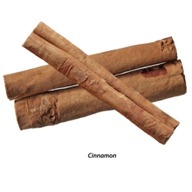
Cardamom
A popular spice in both the Indian and Chinese preparations, cardamom is said to benefit the lungs, kidneys, and heart. It is also a mood elevator.
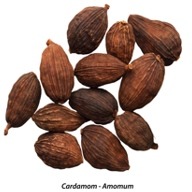
Clove
Native to the spice islands of Indonesia, cloves have been used by the Chinese since 300 BC, and came to Europe in the 4th and 5th Centuries AD. Cloves have pain-relieving and antiseptic attributes. Like pepper and ginger, clove is also used to increase the potency of other herbal blends.
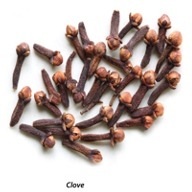
Black Pepper
Widely used to support circulation and metabolism, black pepper can help to alleviate chronic coldness. (We can use more of that here, in the winter!) Attila the Hun demanded this spice as a ransom during the siege of Rome in 408 AD.
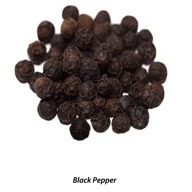
Chinese Star Anise
Traditional Asian herbalists credit star anise with a variety of properties. It’s used frequently as a cough remedy and to freshen the breath.
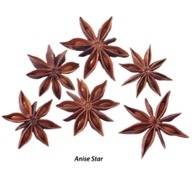
Ginger
Long valued as a stimulant for the circulatory and the immune systems, ginger has been used to treat such disparate conditions as impotence and motion sickness.
Long valued as a stimulant for the circulatory and the immune systems, ginger has been used to treat such disparate conditions as impotence and motion sickness.
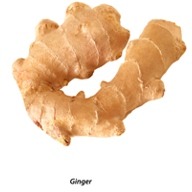
Here is the delicious version of my Almond Tazo Decaf! Chai Latte. (use any Chai Tea)
Ingredients
- 1 Tea Bag Tazo Decaf Chai Tea
- 1 cup Vanilla Almond Milk
- 1 cup Spring Water
- 1 tbsp. Coconut Milk
- 1 tsp. Raw Honey
- cinnamon
Instructions
- Boil water and steep tea bag for about 5 minutes.
- Place Almond Milk, Coconut Milk, Raw Honey into a blender.
- Remove the teabag from the teacup and pour the tea into the blender with the other ingredients.
- Blend for 30 seconds and pour into a big cup
- Garnish with little cinnamon
If you're brave enough to go cold turkey, do a three-day juice fast. Detoxing is a proven way of eliminating addictive substances! More info at juicefastingmaven.com
Hope you'll enjoy your Chai Latte! If you're interested in my main website monikabaechler.com - where you can find my eBooks and recipes - please click the link. Thank you!
’til next time,
Monika Baechler

No comments
Post a Comment